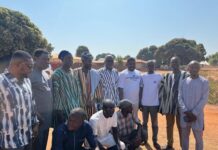Over five million Ghanaians are directly and indirectly employed in the illegal mining sector, which is popularly called galamsey, a new report by the Institute of Statistical Social and Economic Research (ISSER) of the University of Ghana has revealed.
The report, dubbed: “Ghana Social Development Outlook (SDO) 2018” has, therefore, urged the government to re-examine the sector by streamlining it instead of banning the activities of those involved in the sector.
In an interview with the Media after the launch of the report at the University of Ghana in Accra, the Coordinator of the Social Development Outlook at ISSER, Dr Elizabeth A. Asante, said putting a total ban on galamsey meant that five million people were going to be put out of job.
According to her, government could prevent job losses in the galamsey sector by ensuring that the activities of the illegal miners were properly regulated.
“You are putting five million people out of job when you criminalised galamsey,” Dr Asante said, pointing out that “and we are asking you (the government) to reconsider it; why don’t you regularise the galamsey sector?
She explained that when illegal miners (galamseyers) were taught on what to do and what not to do, it would help to protect the country’s environment whilst creating job opportunities for the various people whose livelihoods depended on the sector.
Presentation
Presenting a summary of the report (Social Development Outlook 2018), Dr Asante said the report had provided a two-year valuation of social development in the country, adding that the basic aim of the report was to inform national development and discourse.
She said one of the challenges the institute encountered during the compilation of the report had to do with the paucity of public disaggregated data; hence, calling on the government to increase its support to the Ghana Statistical Service (GSS) to enable it to collect timely and up-to-date data on social and economic development of the country.
The report
The 2018 Outlook has nine chapters, dealing with issues such as Education, Health, Sanitation, Environment, Housing, Work and Employment, Energy, and Governance.
In his welcome address, the Director of ISSER, Professor Peter Quartey, said the SDO was one of the ISSER’s flagship publications on the country’s social development with the aim of influencing development.
He said the Institute had been producing the evidenced-based SDO research and analytical report since 2012 on yearly basis, explaining that unlike macro-data, “social indicators may not change very rapidly.”
Prof. Quartey said the Outlook report offered us the opportunity to assess how the country was meeting the Sustainable Development Goals (SDGs).
According to him, ISSER as one of the leading research facility on the African continent with over 20 researchers, was in the position to provide in-depth analytical information on socio-economic development through non-partisan lenses.
He, commended the immediate past Director of the Institute, Prof. Felix Asante, the authors, reviewers, and the staff of the Institute who contributed immensely to the publication of the 2018 Outlook, as well as the Agricultural Development Bank (ADB), and the World Food Programme for sponsoring the publication.
ISSER
ISSER was established in 1962 and currently serves as the research wing under the College of Humanities of the University of Ghana.
With a goal to be recognised as a centre for comprehensive and sustained research and training in the social sciences, the institute engages in a number of policyrelevant research whose findings are intended to help policy makers on the best policy decisions to make for national development.
National discourse
Prof. Samuel Agyei-Mensah the Provost of the College of Humanities of the University of Ghana, who chired at the event said the SDO since its inception in 2012 had been influencing national discourse and scholarship on social development.
Story: Isaac Asirifi











